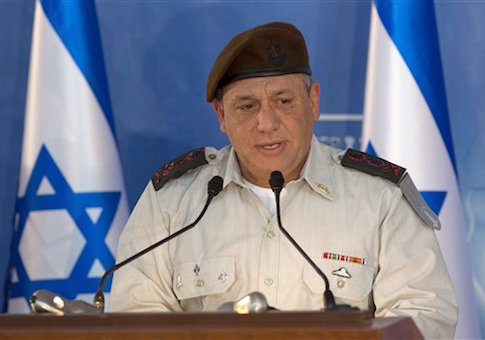JERUSALEM—The commander of Israel’s armed forces said Monday that the nuclear agreement with Iran posed a number of challenges for Israel "but also opportunities."
The statement by General Gadi Eizenkot at a symposium Monday in Tel Aviv was a rare instance of an Israeli leader publicly expressing something positive about the deal struck by the international community with Tehran. The Israeli government was the foremost opponent of the agreement for years. Eizenkot did not spell out what the opportunities for Israel might be but analysts have cited one possibility—increased cooperation between Israel and Sunni Gulf states opposed to Iranian hegemony in the region.
"The sanctions relief and the nuclear deal with Iran represent a strategic shift that the Israel Defense Forces will have to deal with over the coming decade," said Eizenkot. "There is no doubt that the accord is a strategic turning point."
The diminishing of the Iranian nuclear threat, at least for the next few years, permits Israel to focus on other strategic threats in the area, of which there are many. Closest to home, Eizenkot said, and among the most worrying, is the level of approval for ISIS among Palestinians in the West Bank and Gaza Strip as shown in polls. This level, 16 percent, is higher than in any Arab state, he noted. "When Palestinian teenagers take knives and head out for stabbing attacks, they are nourished by ISIS propaganda and have constructed their own Palestinian version."
Acts of terror in the West Bank will continue "for many years", he predicted. The IDF, he noted, must provide security in the area in which 400,000 Israelis live in 161 settlements among two million Palestinians. "The populations are mixed together which creates a huge operational challenge." Any attempt to punish the Palestinians by cutting back on permits held by 120,000 Palestinians to work in Israel and in the settlements would lead to greater violence, warned Eizenkot.
Although the nuclear threat has temporarily receded, Iran remains a strategic concern through its support of anti-Israel proxies. Hezbollah in Lebanon has been receiving $1 billion a year from Teheran, said Eizenkot, and this will doubtless be increased with the lifting of sanctions on Iran as will allocations to Hamas in Gaza. Terming Hezbollah "our central threat," he said the militia "is funded, trained, and even led by Iran".
Under Iran’s guidance, Hezbollah has converted 240 Shiite villages and towns in south Lebanon into rocket assault bases, he said. "Each has its own defense units, rocket launchers, and command and control center."
Despite periodic flare-ups along the border, he said, he did not believe that Hezbollah was interested in a large-scale conflict with Israel whose intelligence has pinpointed these targets and whose air force and ground forces are equipped with precision weaponry.
"Hezbollah understands the implications of an escalation in Lebanon. Our intelligence and operational abilities have improved dramatically since 2006", the year that Israel and Hezbollah engaged in a month-long confrontation.
He predicted that the Sunni-Shiite conflict in Syria will go on for years. "I can’t see any element effectively controlling Syria."
